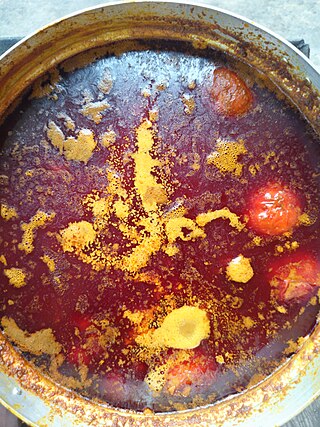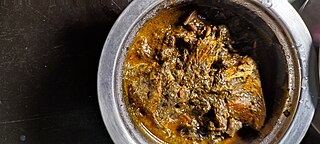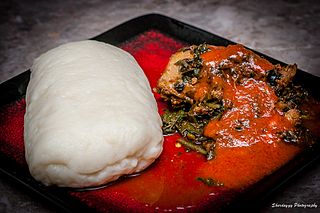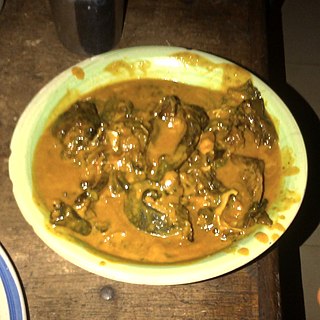Related Research Articles

Owerri is the capital city of Imo State in Nigeria, set in the heart of Igboland. It is also the state's largest city, followed by Orlu, Okigwe and Ohaji/Egbema. Owerri consists of three Local Government Areas including Owerri Municipal, Owerri North and Owerri West, it has an estimated population of 1,401,873 as of 2016 and is approximately 100 square kilometres (40 sq mi) in area. Owerri is bordered by the Otamiri River to the east and the Nworie River to the south. The Owerri Slogan is Heartland. It is also called the Las Vegas of Africa, due to the night life of the city and the numerous hotels, casino and leisure parks all over the city.

Stockfish is unsalted fish, especially cod, dried by cold air and wind on wooden racks on the foreshore. The drying of food is the world's oldest known preservation method, and dried fish has a storage life of several years. The method is cheap and effective in suitable climates; the work can be done by the fisherman and family, and the resulting product is easily transported to market.

Ẹ̀bà (Yoruba) also known as Ebe or Pinon' is a staple swallow from Nigeria, Togo and Benin, also eaten in the West African sub-region and other African countries. The term èbà originates from Yoruba. It is a cooked starchy vegetable food made from dried grated cassava (manioc) flour commonly known as garri all across West Africa. It is often eaten with rich soups and stews, with beef, stockfish or mutton. The dish is often described as having a slightly sour, sharp taste.

Nigerian cuisine consists of dishes or food items from the hundreds of Native African ethnic groups that comprises Nigeria. Like other West African cuisines, it uses spices and herbs with palm oil or groundnut oil to create deeply flavored sauces and soups.
Obomkpa is an Igbo town in the Aniocha North local government area of Delta State, Nigeria.

Igbo cuisine is the various foods of the Igbo people of southeastern Nigeria.
The Urhobos are people located in southern Nigeria, near the northwestern Niger Delta.

Palm nut soup or banga is a soup made from palm fruit common in the Cameroonian, Ghanaian, Nigerian, Democratic Republic of Congo and Ivorian communities. The soup is made from a palm cream or palm nut base with stewed marinated meats, smoked dried fish, and aromatics. It is often eaten with starch, fufu, omotuo, banku, fonio, or rice. The use of the palm fruit in cooking is significant in Ivorian, Cameronian, Nigerian, Ghanaian, Liberian and other West and Central African cuisine.

Okra or Okro soup is prepared using the edible green seed pods of the okra flowering plant as a primary ingredient. Other vegetables can be added to the soup as well, such as ewedu, kerenkere, or Ugu leaf. Depending on the specific variant being prepared, okra soup can have a clear broth or be deep green in colour, much like the okra plant itself. Okra can have a slippery or "slimy" mouthfeel. The edible green seed pods can also be used in other stews and soups, such as the American dish gumbo.

Nsala soup, also known as white soup, and called ofe nsala by the Igbo people, is a delicacy that originates from the eastern part of Nigeria. A major ingredient is catfish, which gives the soup a unique taste. It also contains small pieces of yam or cocoyam with utazi leaves. Nsala is similar to Afia Efere, which is common among the Efik ethnic group.

Atama soup or Amme-Eddi is also called Banga Soup in pidgin English(Nigerian English) It is a kind of palm-fruit vegetable soup that originates from the Efik people of Cross River state, Urhobo and Isoko people of Delta State in South South Nigeria. It’s a popularly food among the Delta, Cross River and Akwa Ibom State People of Nigeria. The Urhobo people of Delta state called it Amme-edi or Banga soup. The soup is made from palm fruit-pulp that is derived from palm fruit; the extracted palm-pulp is base primary ingredient for the soup. Atama or Amme-edi(Banga) soup is thick and dark brown in color. It’s normally prepared with choice of protein like fresh meat or dry meat(mostly bush meat), dry fish, fresh fish and sometimes shrimp(dry or fresh), periwinkle as added proteins for more enhanced flavor. Ingredients: primary ingredients are fresh palm-pulp sourced from palm fruit, salt and pepper and secondary ingredients which are decided based on preference of the cooker are onions, salt, pepper(different kinds of pepper are preferences) and different kinds of spices could be added depending on the cooker preferred or desired taste or flavor. This soup could be styled into different flavors depending on cooking preferences. Every added ingredient could drastically change the taste of the food.

Myrianthus is a genus of flowering plants in the nettle family (Urticaceae). They are mainly found in Tropical Africa. They are mostly tropical trees, shrubs, or lianas. Leaves are simple and pinnately veined or with a palmate structure. It is dioecious, with separate male and female plants.

Myrianthus arboreus, the giant yellow mulberry or monkey fruit or Nyankama, in the Akan twi language of Ghana, is a dioecious tropical tree in the genus Myrianthus. It lives in the tropical Central African countries of Central African Republic, Gabon, Cameroon, Nigeria, and Tanzania, and also Ghana in the West African countries. Its chromosome count is 2n = 28.

Oha soup is a soup mostly eaten in the south eastern part of Nigeria.

Pounded yam or Iyán (Yoruba) or Ruam-Yo (Tiv) or sakwara in Hausa, "Akpu, Utara-ji or Nni-ji" (Igbo) is a Nigerian swallow or Okele food native to the Yoruba, Edo, Igbo Tiv and Ebira ethnic groups. It is a traditional food prepared by pounding boiled yam with a mortar and pestle. Pounded yam is similar to mashed potatoes but heavier in consistency. It is a smooth and tasty delicacy traditionally eaten with the hands.

Oghwo evwri is a soup eaten in the south-central region of Nigeria. It is common among the Urhobo and Isoko. The soup is made with garri soaked in water after palm oil and potash mixture has been added. It is traditionally served at weddings in the Delta State; its absence at a wedding celebration is considered insulting to guests. It is also served at other traditional celebrations.
Eka soup, also known as ekuku, is a delicacy of three tribes in the Eastern region of Nigeria. It is prepared from mashed palm kernel, roasted groundnut and benne seeds. Eka soup is commonly eaten with starchy foods such as fufu. Eka Soup is a popular dish among the Idomas of Benue State, the Ogojas in Cross River and the Ibirams of Kogi state.
Ofe achara is an Igbo soup made mainly from Achara and mgbam. Ofe In the language refers to soup.
Ofe Owerri is an Igbo delicacy in the South-Eastern part of Nigeria. The soup is made with snails, beef, assorted meat and fishes.

Afia Efere is a Nigerian soup popular amongst the Efik tribe, the soup is also known as white soup due to absence of palm oil in it.
References
- ↑ oguntayo, gbenga (2021-12-28). "Native delicacy from Delta State (Ofè Ujuju)". Pulse Nigeria. Retrieved 2022-06-30.
- ↑ Ukegbu, P. O.; Okebugwu, J. O. (2018). "Chemical and sensory assessment of Ujuju (Myrianthus arboreus) leaf and soup". Nigerian Journal of Nutritional Sciences. 39 (1): 50–58. ISSN 2805-4008.
- 1 2 Ashimedua (2021-08-07). "Native delicacy from Delta State (Ofè Ujuju)". Vanguard Allure. Retrieved 2022-06-30.